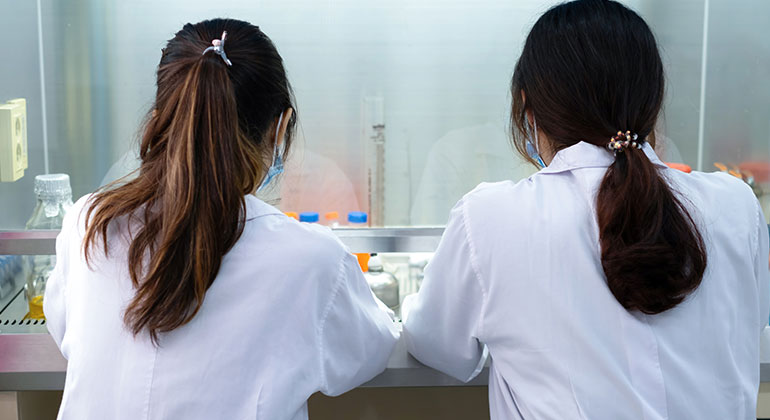SARS-CoV-2 Infection Likely Not Associated With Increased Risk of New-Onset Diabetes
New research challenges previous hypotheses that direct beta cell infection and destruction by COVID-19 virus may precipitate diabetes

SARS-CoV-2 infection is likely not associated with an increased risk for new-onset diabetes, according to an Icahn School of Medicine at Mount Sinai research team that used an in vitro system to model the infection of human pancreatic cells by the virus that causes COVID-19.
The findings, published online in Cell Reports, address concerns raised over the past 18 months that infection with SARS-CoV-2 may trigger new-onset diabetes. Evidence in support of this assertion, however, has remained sparse, and precise risk assessment is hampered by, at times, conflicting evidence.
The team of researchers at the Icahn School of Medicine at Mount Sinai, led by Dirk Homann, MD, Professor of Medicine (Endocrinology, Diabetes and Bone Disease) at Icahn Mount Sinai, demonstrated that SARS-CoV-2 targets practically all pancreatic cell types, not just the insulin-producing beta cells from regions known as islets of Langerhans, relying on the viral entry receptor ACE2. However, the infection in the pancreas remained highly circumscribed, largely non-cytopathic—meaning that the infected cells generally did not die as a result—and despite high viral burden in infected subsets, promoted only modest cellular perturbations and inflammatory responses.
Similar experimental outcomes were also observed after in vitro infection with endemic coronaviruses not previously associated with diabetes. Altogether, these findings challenge the notion that direct beta cell infection and destruction by SARS-CoV-2 can precipitate diabetes onset.
“Our provisional conclusions indicate that SARS-CoV-2 infection is likely not associated with an increased risk for new-onset diabetes,” said Dr. Homann, who is the corresponding author on the study. “However, a history of SARS-CoV-2 infection may yet promote prolonged glycometabolic perturbations and even an increase in cumulative diabetes risk in vulnerable populations. Over the next few years, we need to pay careful attention to emerging observational and retrospective studies that determine diabetes incidence rates of previously SARS-CoV-2-infected individuals.”
To evaluate permissiveness of human pancreatic islet cells to in vitro SARS-CoV-2 infection, the team of researchers employed an in vitro infection model of primary human pancreatic islets with SARS-CoV-2 as well as endemic human coronaviruses. Leveraging a series of complementary and newly adapted state-of-the-art technologies, the team precisely delineated pancreatic infection patterns and associated cellular changes at the single-cell level. Altogether, they found that the extent and consequences of pancreatic SARS-CoV-2 infection, even under in vitro conditions of enhanced virus exposure, remained decidedly limited.
“Concerns surrounding the possibility that infection with SARS-CoV-2, the etiological agent of COVID-19, may cause new-onset diabetes persist amidst an evolving research landscape,” said Verena van der Heide, MD, PhD, co-first author of the study and postdoctoral research fellow at the Icahn School of Medicine at Mount Sinai. “Our findings stand in notable contrast to three recent reports that also based their speculation about the diabetogenic potential of SARS-CoV-2 on in vitro infection of human islets. As detailed in our manuscript, however, we believe that our careful experimental design and comprehensive analysis strategy make a compelling case for the considerable limits of pancreatic SARS-CoV-2 infection.”
Sonia Jangra, PhD, and co-senior author Michael Schotsaert, PhD, were among the other members of Dr. Homann’s team who contributed to the study.
“There are strong epidemiological associations between COVID-19 infection in humans and diabetes, but whether the SARS-CoV-2 virus actually infects and damages the insulin-producing cells in the human pancreas, the so-called ‘beta cells,’ has been highly controversial,” said Andrew Stewart, MD, Director of the Diabetes, Obesity and Metabolism Institute at Icahn Mount Sinai. “This study by Dr. Homann and his collaborators in Mount Sinai’s Precision Immunology Institute and the Department of Microbiology provides strong evidence that SARS-CoV-2 causes little or no damage to beta cells, making it unlikely that COVID-19 infection can predispose to development of Type 1 diabetes.”
These conclusions are in line with an earlier report from Dr. Homann and his team, published in 2020, that expression of SARS-CoV-2 entry factors, in particular ACE2, is largely absent from islet endocrine cells but readily detected in microvascular and ductal structures of the pancreas.
About the Mount Sinai Health System
Mount Sinai Health System is one of the largest academic medical systems in the New York metro area, with more than 43,000 employees working across eight hospitals, over 400 outpatient practices, nearly 300 labs, a school of nursing, and a leading school of medicine and graduate education. Mount Sinai advances health for all people, everywhere, by taking on the most complex health care challenges of our time — discovering and applying new scientific learning and knowledge; developing safer, more effective treatments; educating the next generation of medical leaders and innovators; and supporting local communities by delivering high-quality care to all who need it.
Through the integration of its hospitals, labs, and schools, Mount Sinai offers comprehensive health care solutions from birth through geriatrics, leveraging innovative approaches such as artificial intelligence and informatics while keeping patients’ medical and emotional needs at the center of all treatment. The Health System includes approximately 7,300 primary and specialty care physicians; 13 joint-venture outpatient surgery centers throughout the five boroughs of New York City, Westchester, Long Island, and Florida; and more than 30 affiliated community health centers. We are consistently ranked by U.S. News & World Report's Best Hospitals, receiving high "Honor Roll" status, and are highly ranked: No. 1 in Geriatrics and top 20 in Cardiology/Heart Surgery, Diabetes/Endocrinology, Gastroenterology/GI Surgery, Neurology/Neurosurgery, Orthopedics, Pulmonology/Lung Surgery, Rehabilitation, and Urology. New York Eye and Ear Infirmary of Mount Sinai is ranked No. 12 in Ophthalmology. U.S. News & World Report’s “Best Children’s Hospitals” ranks Mount Sinai Kravis Children's Hospital among the country’s best in several pediatric specialties.
For more information, visit https://www.mountsinai.org or find Mount Sinai on Facebook, Twitter and YouTube.